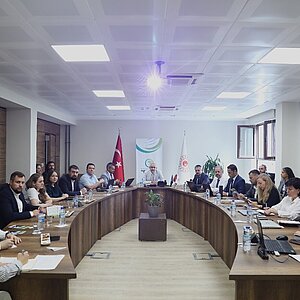Ukraine's path to implementing an emissions trading scheme

A collaborative journey towards emissions trading supported by the German Government through its International Climate Initiative.
An Emissions Trading System (ETS), also known as a carbon market or cap-and-trade system, is an approach to tackling the problem of greenhouse gas emissions that contribute to climate change. It is designed to encourage companies and industries to reduce their emissions in a cost-effective manner.
The idea behind an ETS is to provide a financial incentive for companies to invest in cleaner technologies, energy efficiency and renewable energy sources. By putting a price on carbon emissions, the system encourages companies to find innovative ways to reduce their greenhouse gas output, helping to mitigate climate change and promote the transition to a low-carbon economy. Depending on its scope and ambition as well as the environmental, economic and social impacts, an ETS can significantly affect a wide range of stakeholders.
It is therefore vital for the successful implementation of any ETS to engage relevant stakeholders throughout the policy design process. By actively engaging stakeholders, including government agencies, industries, environmental organisations and civil society, Ukraine can benefit from diverse perspectives, local knowledge and expertise. This participatory approach allows for the identification of potential challenges, the inclusion of different viewpoints and the development of tailored solutions that align with national priorities and objectives.
Continuing the stakeholder engagement process despite the war in Ukraine
In December 2021, the IKI Project “Supporting the implementation of an emissions trading scheme in Ukraine” launched the stakeholder engagement process in Ukraine together with the country’s Ministry of Environmental Protection and Natural Resources. This support further bolsters the stakeholder engagement process by providing technical expertise, capacity building and financial resources. Despite the outbreak of a war and the resulting challenges, with regular air-raid sirens and electricity outages, the stakeholder participation process continued and was efficient and fruitful.
Approximately 500 individual participants from all over Ukraine took part in the process during seven online events. The average attendance was 125 participants per event representing different stakeholder groups. Most attendees were representatives of government authorities (30%), installation operators (28%) and consulting companies (11%), but there were also participants from international organisations (9%) as well as NGOs and educational or scientific institutions (8%).
Fostering an inclusive and transparent decision-making process
The stakeholder participation process and collaboration fostered an inclusive and transparent decision-making process. This will enable Ukraine to design and implement an ETS that reflects the country's unique context and ensures a just transition towards a low-carbon economy. A report summarising the process and stakeholders’ views was submitted with recommendations to the Ukrainian Ministry of Environmental Protection and Natural Resources for consideration during the policy design process. As a result, it is anticipated that the ETS in Ukraine will not only be effective and proportionate, but will also enjoy a high level of public support.
The link has been copied to the clipboard
Contact
IKI Office
Zukunft – Umwelt – Gesellschaft (ZUG) gGmbH
Stresemannstraße 69-71
10963 Berlin





